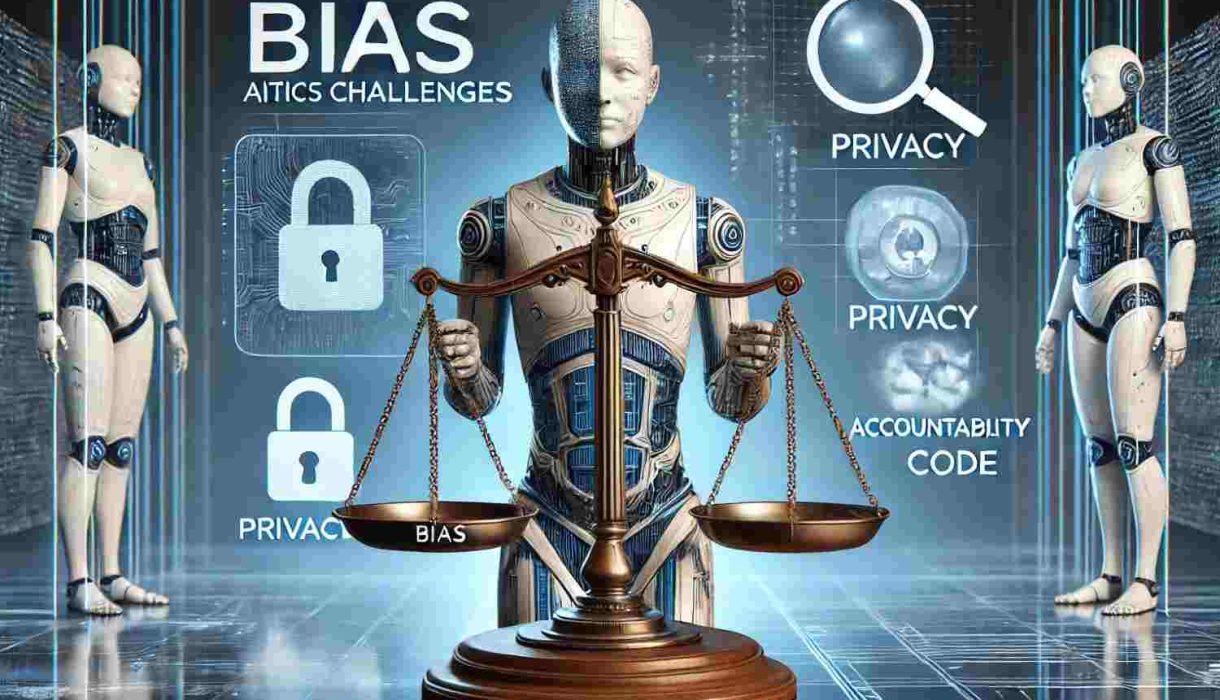
Navigating the Ethics of AI: What’s at Stake?
Ethics of AI: Who Decides What’s Right?
Delves into the complex landscape of AI ethics, exploring the potential risks and moral considerations behind AI technologies. Through anecdotes and thought-provoking questions, readers will gain insight into the importance of ethical standards in the development and deployment of AI systems.
Imagine waking up one day to find that an AI companion not only knows your routine but also makes decisions about your life. This futuristic scenario isn’t as far off as we might think. With AI technologies becoming ever more integrated into our lives, it raises a critical question: should we be concerned about what we’re creating? In this post, we unravel this pressing dilemma.
The Unseen Consequences of AI Technologies
Artificial Intelligence (AI) is reshaping our world. It promises efficiency and innovation. Yet, it also brings unseen consequences. These consequences can be troubling. They often emerge from the very systems designed to help us. This section explores real-world examples of AI mishaps, the long-term societal implications of AI decisions, and a personal anecdote about a small business affected by AI.
Real-World Examples of AI Mishaps
AI systems are not infallible. They can make mistakes that have serious repercussions. One notable example is biased algorithms. These algorithms can perpetuate existing prejudices. For instance, in the criminal justice system, AI is used to predict recidivism. But what happens when the data fed into these systems reflects societal biases? The results can be devastating.
- In 2016, a report revealed that an AI tool used in the U.S. penal system was biased against African Americans. It falsely flagged them as high-risk offenders more often than their white counterparts.
- Another example is facial recognition technology. Studies show that it misidentifies people of color at a much higher rate than white individuals. This can lead to wrongful arrests and other serious consequences.
These examples highlight a critical question: How can we trust AI when it can reflect our worst biases? The implications are profound. When AI systems are flawed, they can reinforce discrimination rather than eliminate it.
Long-Term Societal Implications of AI Decisions
The decisions made by AI systems can have long-lasting effects. Consider employment. AI is increasingly used in hiring processes. Many companies rely on algorithms to screen resumes. But what if these algorithms are biased? They might overlook qualified candidates based on race, gender, or age. This not only affects individuals but also the diversity of the workforce.
Moreover, AI can influence public policy. For example, predictive policing uses AI to allocate police resources. This can lead to over-policing in certain neighborhoods, creating a cycle of distrust between communities and law enforcement. The societal implications are staggering. They can affect everything from job opportunities to community relations.
Anecdote: A Small Business Impacted by AI
AI’s impact isn’t limited to large corporations or government agencies. Small businesses feel the effects too. Take the case of a local coffee shop owner, Sarah. She relied on an AI-driven marketing tool to target potential customers. Initially, it seemed like a great idea. The tool analyzed data and suggested the best times to post on social media.
However, Sarah soon noticed something strange. The AI was targeting a demographic that didn’t align with her customer base. It focused on younger audiences, ignoring her loyal older customers. As a result, her sales dropped. She had to rethink her marketing strategy. This experience taught her a valuable lesson: AI can be a powerful tool, but it requires careful oversight.
Sarah’s story is a reminder that AI can sometimes lead businesses astray. It emphasizes the need for human judgment in decision-making processes. After all, technology is a double-edged sword. As Jaron Lanier aptly puts it,
“Technology is a double-edged sword, and AI is one of its sharpest blades.”
AI technologies hold immense potential. Yet, they also come with risks that cannot be ignored. From biased algorithms to unintended consequences for small businesses, the unseen impacts of AI are significant. As society continues to integrate AI into daily life, it is crucial to remain vigilant. Understanding these challenges is the first step toward harnessing AI’s power responsibly.
The Balancing Act: Innovation vs. Ethical Responsibility
In today’s fast-paced tech world, the rise of artificial intelligence (AI) brings both excitement and concern. Companies are racing to innovate, but what happens when they prioritize profit over ethical considerations? This section delves into the corporate responsibility that comes into play when AI fails. It also explores the tension between profit motives and ethical standards in AI development, culminating in a hypothetical scenario that illustrates the stakes involved.
Corporate Responsibility When AI Fails
When AI systems malfunction, the consequences can be severe. Think about it: a self-driving car miscalculates a stop sign, leading to an accident. Who is responsible? Is it the company that designed the AI? The engineers who programmed it? Or perhaps the executives who pushed for a rushed release?
- Companies must take accountability for their products.
- They need to ensure that their AI systems are safe and reliable.
- Transparency is key; customers deserve to know what went wrong.
In recent years, there have been discussions about the need for legislation surrounding AI accountability. Governments are beginning to recognize the importance of holding companies responsible for their AI systems. This is a crucial step in ensuring that technology serves humanity, not the other way around.
The Tension Between Profit Motives and Ethical Standards
As companies strive to outdo one another, the pressure to innovate can lead to ethical compromises. The drive for profit often overshadows the need for responsible AI development. This creates a conflict. On one hand, there’s the desire to be the first to market with a groundbreaking product. On the other hand, there’s the responsibility to ensure that product is safe and ethical.
Consider the following points:
- Profit-driven motives can lead to shortcuts in development.
- Ethical standards may be overlooked in the rush to innovate.
- Long-term consequences of these decisions can be dire.
Timnit Gebru, a prominent voice in AI ethics, once said,
“We have to ensure that our technological advancements don’t come at the cost of our humanity.”
This statement encapsulates the essence of the ethical dilemma faced by tech companies today. How can they balance the need for innovation with the responsibility to protect users and society at large?
A Hypothetical Scenario: The Pressure to Release an Untested AI Product
Imagine a tech company on the brink of launching a revolutionary AI product. The marketing team has already built hype. Investors are eager for returns. But there’s a catch: the AI hasn’t been thoroughly tested. The engineers express concerns about potential flaws, but the executives are adamant. They argue that the competition is fierce, and delaying the launch could mean losing their edge.
In this scenario, the company faces a critical decision:
- Release the product and risk public backlash if it fails.
- Delay the launch, ensuring safety but potentially losing market share.
This situation highlights the ethical quandary many tech companies face. The pressure to deliver can lead to decisions that compromise safety and ethical standards. It raises questions about the role of corporate responsibility in AI development. Should companies prioritize their bottom line over the well-being of their users?
Ultimately, the balance between innovation and ethical responsibility is delicate. Companies must navigate this landscape carefully. As discussions around AI accountability continue to evolve, it is crucial for tech leaders to consider the long-term implications of their decisions. The future of AI depends not only on technological advancements but also on the ethical frameworks that guide them.
A Call for Collective Action and Vigilance
As artificial intelligence (AI) continues to evolve, the conversation surrounding its ethical implications becomes increasingly crucial. The rapid advancement of technology can be both exciting and daunting. It raises questions about the responsibilities of developers and consumers alike. How can society ensure that AI is used responsibly? What role do individuals play in this complex landscape? These are questions that deserve our attention.
Engaging in Discussions About AI Ethics
One of the most effective ways to promote ethical AI is through open dialogue. Engaging in discussions about AI ethics is not just for tech experts. It is for everyone. Whether you are a developer, a consumer, or simply a curious citizen, your voice matters. By participating in these conversations, individuals can help shape the future of technology.
Consider this: when was the last time you discussed the implications of AI with friends or family? Conversations can spark ideas and raise awareness. They can lead to informed opinions and collective action. Informed citizenship in a digital age is essential. It empowers individuals to advocate for ethical practices and hold companies accountable.
Responsible AI Use and Development
Both consumers and developers have a role to play in ensuring responsible AI use. Here are some suggestions:
- For Consumers: Stay informed about the technologies you use. Understand how they work and their potential impact on society. Ask questions and demand transparency from companies.
- For Developers: Prioritize ethical considerations in your work. Implement guidelines that promote fairness, accountability, and transparency. Collaborate with ethicists and social scientists to understand the broader implications of your creations.
These steps may seem small, but they can lead to significant changes. When consumers demand ethical practices, companies are more likely to respond. Similarly, when developers prioritize ethics, they contribute to a culture of responsibility within the tech industry.
A Personal Experience in Technology Policymaking
Reflecting on personal experiences can shed light on the importance of public engagement in technology policymaking. A few years ago, I attended a town hall meeting focused on technology regulation. The room was filled with concerned citizens, tech enthusiasts, and policymakers. It was inspiring to see so many people passionate about the future of technology.
During the meeting, various stakeholders shared their perspectives on AI and its implications. Some expressed concerns about privacy, while others highlighted the potential for job displacement. The diversity of opinions was eye-opening. It reinforced the idea that everyone has a stake in the conversation about AI ethics.
This experience taught me that public engagement is vital. It is not enough for policymakers to make decisions in isolation. They need input from the community. When individuals share their experiences and concerns, it leads to more informed and balanced policies.
Promoting Informed Citizenship
In today’s digital age, informed citizenship is more important than ever. Organizations like the Partnership on AI and the AI Ethics Lab are working tirelessly to promote ethical AI practices. They provide resources, conduct research, and advocate for responsible technology use. Supporting such organizations can amplify efforts toward ethical AI.
As Kate Crawford wisely stated,
“In today’s world, every technology should be subject to ethical scrutiny.”
This quote encapsulates the essence of our responsibility as a society. We must scrutinize the technologies we create and use. It is not just about innovation; it is about ensuring that innovation serves humanity positively.
In conclusion, the call for collective action and vigilance in the realm of AI ethics is clear. Engaging in discussions, advocating for responsible practices, and participating in policymaking are essential steps. Each individual has a role to play in shaping the future of technology. By promoting informed citizenship and supporting organizations dedicated to ethical AI, society can work towards a future where technology benefits all. The time to act is now. Let us not wait until it is too late.
TL;DR: As AI continues to evolve, understanding its ethical implications is crucial. This post examines the moral questions surrounding AI development and what that means for our future.
AIResponsibility, FutureOfAI, TechnologyAndMorality, AIEthics, EmergingTechnologies, ImpactOfAI, AIAccountability, EthicalAIUsage, SocietalImpactOfAI
#AIAccountability, #ImpactOfAI, #EmergingTechnologies, #AIEthics, #EthicalAIUsage, #SocietalImpactOfAI, #TechnologyAndMorality, #FutureOfAI, #AIResponsibility,#AIethics, #ArtificialIntelligence, #DigitalResponsibility, #BiasInAI, #TechPolicy, #AIAccountability, #EthicalTechnology, #AIoversight, #AIRegulation, #HumanCenteredAI

